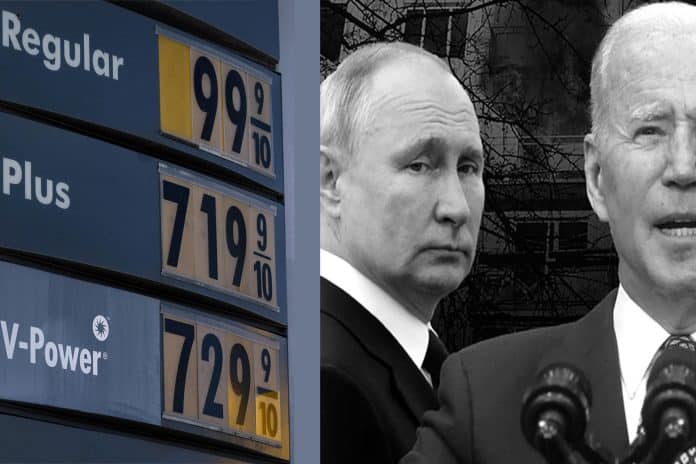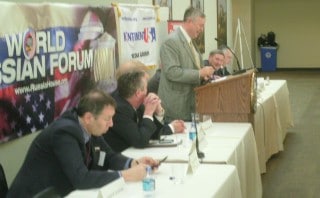By Dr. George Krasnow
![]() It is never boring at the World Russian Forum (WRF), a two-day conference of politicians, business people, and scholars from Russia and the U.S. who have been meeting annually since 1981 with the intent of improving U.S.-Russia relations.
It is never boring at the World Russian Forum (WRF), a two-day conference of politicians, business people, and scholars from Russia and the U.S. who have been meeting annually since 1981 with the intent of improving U.S.-Russia relations.
WRF was created by Eduard Lozansky, a former Soviet nuclear physicist and dissident who emigrated to the U.S. during the Cold War and is now a U. S. citizen. Since the collapse of the U.S.S.R., he has been running the American University in Moscow (AUM) which co-sponsors the Forum. Discovery Institute of Seattle and the Eurasia Center of Washington joined Lozansky’s effort in people’s diplomacy.
Having attended several such forums, I can say that this one, the 30th was as remarkable as any. As usual, the first day’s proceedings, on March 29, took place in Hart Senate Office Building and ended with a reception at the Russian Embassy dedicated to the 50th anniversary of Yuri Gagarin’s first manned flight. On the second day, the Forum moved to George Washington University Business School and the Russian Cultural Center.
The Forum featured a number of high-caliber speakers: Russian Ambassador Sergei Kislyak, Deputy Assistant Secretary of State Daniel Russell, U.S. Congressmen Tom Price and Dana Rohrabacher, as well as Sergei Markov, Deputy of the Russian Duma. The business was represented by such people as Edward Verona, President of, the U.S.-Russia Business Council, and Dmitry Akhanov, President, of Rusnano. Among prominent scholars were Andrew Kuchins, Director of the Russia and Eurasia Programs, CSIS, Robert Legvold, Columbia University, and Sergey Rogov, Director, of the Institute of the USA and Canada.
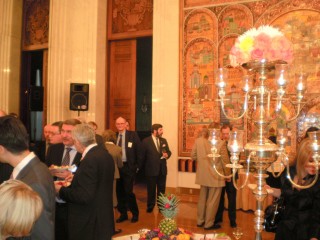
The Forum’s overarching theme, “U. S. – Russia Relations: The Strategic Alliance via Innovation and Technology,” smacked mostly of wishful thinking. ‘My goal,’ said Lozansky in his interview for the Voice of America, ‘is to create a strategic alliance between Russia and the U.S., on par with that between the U.S. and the U.K. Many people regard my idea utopian, but I have the right to state it.’ There were panel discussions on topics such as Russian-American high-tech cooperation “From Silicon Valley to Skolkovo,” “Russia’s Road to Economic Modernization,” “Future agenda for U.S.-Russia cooperation,” and “The Role of Russian Diaspora in Bolstering U.S.–Russia Cooperation.”
Russian Opposition Was There Too
Arkady Murashev, President, the Center for Liberal Conservative Policy, Yevgeny Savostyanov, Executive VP, the Center for U.S.-Russia Rapprochement, and Leonid Gozman, Co-chair of, Political party “The Right Cause,” represented Russian civil society. All three deplored the lack of democracy and rule of law in Russia and noted that a closer relationship with the U.S. is necessary for both economic modernization and democratization of Russia.
Alas, their view of the United States was marked by much ignorance and naiveté of which Russian “Westernizers” have often suffered. However, Murashev made one astute observation:
Just because Russians look physically like, say, Germans or (white) Americans, one should not assume they are an easy target for “Westernization.” This was one of the mistakes Russian reformers and their Western advisers made during the 1990s, Murashev said. Among the Forum’s highlights was the lively exchange between Konstantin Kosachev, head of the Duma Committee on International Relations, and Richard Perle, the influential American neoconservative.
Konstantin Kosachev
Kosachev set a positive tone in his review of U.S.-Russia relations since the “reset” with Russia. Among “reset” achievements, he named ratification of the START treaty, cancellation of U.S. plans to deploy the anti-ballistic missile system in Poland and the Czech Republic, talks about linking Russia’s ABM system with that of NATO, as well as Russia’s concessions on Iran and the use of Russian airspace for NATO military transports to Afghanistan.
At the same time, he pointed out areas of considerable disagreements, such as Georgia and Kosovo, as well as the obstacles the U.S. raised to impede Russia’s ascension to the World Trade Organization (WTO), such as the notorious Jackson-Vanik amendment, which, Russians feel, unfairly ties Russia’s ascension to the WTO to the freedom of Jewish emigration, even though Russia and Israel now have visa-free travel.
Kosachev’s tone was conciliatory. He avoided accusing the U.S. government directly of anything. However, the U.S. failure to eradicate poppy plantations in Afghanistan is indirectly responsible for up to 30,000 young Russians’ lives lost every year due to a drug addiction ‘since Afghanistan is next to us,’ said Kosachev. Unlike some hawks in the Duma, Kosachev supported Russia’s recent decision not to veto the Libya No-Fly Zone resolution. At the Forum, however, he expressed, some apprehensions about the U.S. and its allies exceeding the U.N. mandate by taking the rebels’ side.
Kosachev called on the U.S. to abandon its mission as the only Super-Power. But, while calling this mission obsolete, he credited it with “certain achievements.” “For many decades, the USA indeed bore on its shoulders the mission of facilitating democratization in many other countries, including the then Soviet Union,” he acknowledged, suggesting that the U.S. may now need Russia for sharing responsibilities for global security.
Kosachev’s view of the waning U.S. role in global affairs did not sit well with Richard Perle, former Assistant Secretary of Defense. Perle was one of the founders of the neoconservative movement that dominated U.S. foreign policy under George W. Bush. He was one of the chief pushers for the Iraq War and later served as an adviser to both Israeli Prime Minister Benjamin Netanyahu and Libya’s Gaddafi.
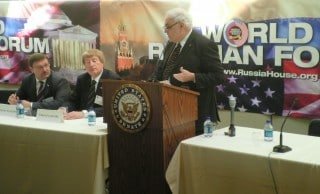
Brashly ignoring Kosachev’s conciliatory tone, Perle accused him of resorting to propaganda in the spirit of the Cold War. Where Kosachev saw a “reset” policy achievement, Perle saw only failures. He asserted that Russia attacked Georgia; that the START agreement has little value; and that it was prudent of the U.S. to want oil pipelines to bypass Russia which ‘cannot be trusted.’
Perle denounced the Russian government for curtailing democratic freedoms of the 1990s. According to Perle, Russian media is controlled by the government, and there is less freedom now than there was ten years ago. Putin wants a Cold War and Russia is conducting it, said Perle. He also berated the Russian government for its centralized economy in which ‘I would not want to invest even a dime.’ ‘The only good news I have,’ Perle went on, ‘is that the Jackson-Vanik Amendment, which I wrote and therefore know its wording, mentions neither the USSR nor Jews; it only requires a free-market economy and freedom of emigration.’
‘You qualify on both counts,’ said Perle, ‘therefore the amendment does not apply to you.’ ‘Speeches like that of Kosachev do not help Russia acquire new friends,’ concluded Perle. In the little amount of time Kosachev had for rebuttal, he stood his ground diplomatically.
Dana Rohrabacher
An indirect, but more forceful rebuttal came not from the Russian camp, but from a fellow American. Congressman Dana Rohrabacher (R-CA), now in his 12th term in the House, addressed the Forum at the end of the day when Perle was gone. Rohrabacher had served as one of President Reagan’s senior speech writers, and, according to Wikipedia, took part in formulating the Reagan Doctrine to counter the global expansion of the Soviet Union. However, since the demise of the U.S.S.R., he has at times taken a pro-Russian position.
In 2008 Congressional hearings he testified that during the Yeltsin reforms, “The United States didn’t assist Russia’s new democratic government [as]… swindlers and ravens flew to Russia and robbed its natural resources.”
In his address at the Forum, Rohrabacher focused on the August 2008 South Ossetian war. Apparently unaware of Perle’s earlier comments, he said that the U.S. was wrong in ascribing the aggression to Russia. ‘We were wrong about the Russian attack on Georgia. The Russians were right. The Georgians started it; the Russians ended it,’ roared Rohrabacher to a loud round of applause.
Visa Free Travel?
One of the more hopeful news items at the Forum was Kosachev’s suggestion that Visa regulations between the U.S. and Russia may be eased and even abolished. He stressed that Russia is ready to do so on the condition of reciprocity. This announcement came on top of a recent meeting of Vladimir Putin with U.S. Vice-President Joseph Biden. Later Russian Deputy Foreign Minister Sergey Ryabkov said that, as a first step, Moscow is ready to sign an agreement on visa-free visits for a period of up to 90 days.
The Role of the Russian Diaspora
On the second day “The Role of Russian Diaspora in bolstering U.S.–Russia Cooperation” was discussed at the Russian Cultural Center. Arkady Murashev and Yevgeny Savostyanov reported about the newly formed Center for U.S.–Russia Rapprochement. According to them, neither modernization nor democratization of Russia can be successful without Russia going into an alliance with the U.S.
However, some diaspora members challenged this idea because any such alliance would inevitably result in Russia’s subordination, claiming there is simply too much russophobia in the U.S. for Russia to be accepted as an equal partner. Eugene Ivanov, a Russian geneticist residing in the U.S., described how The Washington Post’s editorials routinely present a biased view of Russia. In his blog Ivanov runs a column, Pravda on the Potomac, in which the editorial bias is methodically uncovered. Systematic distortion of Russian reality in U.S. media necessitated the existence of such American sites as Russia: Other Points of View.
Does the “Reset” Policy Work?
The word most frequently used at the Forum was “reset,” a reference to the now famous “reset button” that VP Biden used to describe the Obama administration’s plan to pull U.S.-Russia relations to the level of normalcy. No doubt, under Obama relations improved considerably, with the Russian government more than willing to reciprocate.
But are relations really normal in the sense of preventing a sudden reversal that might lead us back to the hostilities of the Cold War or worse? I did not feel so reassured during the Forum. After all, the Forum took place against the background of the U.S. and NATO bombing of Libya, an act of war not authorized by the U.S. Congress on whose premises we were sitting at the time. Here our Russian guests, especially those critical of the lack of democracy in Russia, came to seek a sustainable partnership or even military alliance with the U.S., and all we offered was playing with the reset button even while Perle sang paeans to U.S. global hegemony. Alas, Perle’s neoconservative views are much more influential in the country than those of Congressman Rohrabacher.
As speaker after speaker acknowledged that “reset” is not a goal but only a means to a better relationship, I thought that perhaps Russia and America defined “better” differently. Was it not the “reset” thinking that made Russia abstain from vetoing the No-Fly Zone resolution in the hope that the U.S. would “abstain” from bombing? The Obama administration was only too happy to “reset” the war button from the “shock and awe” bombing of Iraq under Bush to the “humanitarian” type of bombing used against Yugoslavia under Clinton. Do we expect the Russians to feel “better” by merely resetting the U.S. imperial designs from Bushism back to Clintonism? Below are some reflections on post-Cold War U.S. – Russia relations.
“Replace the Entire Operating System”
At the outset of the Obama presidency, I doubted the wisdom of “reset.” In fact, I offered another term that best encapsulated the need for change. In my review of the World Russia Forum 2009, I suggested that, instead of playing with the reset, Obama and Medvedev should think about “Replacing the Entire Operating System.” I borrowed the expression from one of the speakers at the 2009 Forum, E.Wayne Merry. As Chief political analyst at the U.S. Embassy in Moscow during 1990-1994, Merry witnessed how the ideological “neoliberal” economists hijacked U.S. foreign policy and imposed on Russia the “Washington consensus” scheme of reforms which allowed Rohrabacher’s “swindlers and ravens” rob Russia and which became the basis of the current operating system. American scholar, Janine Wedel, described those dealings in the context of clumsy and portentous U.S. meddling in the affairs of the post-Communist world.
It is a shame that her book, Collision, and Collusion: The Strange Case of Western Aid to Eastern Europe, for which she won the Grawemeyer Award for Ideas Improving World Order, was never translated into Russian and remains unknown there. This is in spite of the fact that the book deals directly with the events that proved seminal in the creation of crony capitalism and oligarchy in Russia.
America Needs to Modernize Too
Our Russian friends seem blissfully unaware that there are serious problems with democracy not only in Russia but in the U.S. as well. Many Americans feel that not only our war-prone foreign policy is obsolete, but so is our economic and political system. In fact, Barack Obama got elected in the midst of a global recession on the promise to radically transform the U.S. economic system to make it fairer to the poor and to “spread the wealth around.” Instead, Obama hired some of the same “neoliberal” economists who messed up with Russian reform and were responsible for deregulating the derivatives market which contributed to the financial crisis (See my article Obama’s Perestroika Challenge: US & Russia ).
However, our mainstream media is so selective in what they cover that the majority of Americans do not know what’s going on in the world and even in their own town. As I wrote in my reports about recent antiwar rallies in Washington, on December 16, 2010, and on March 19, 2011, the media routinely ignores such rallies. The mainstream media is not only in cahoots with the government but often spearheads the drive for war, be it in Yugoslavia, Iraq, Afghanistan, or Libya. Many Americans now regularly watch BBC, Al Jazeera, and even RT offset the lack of objective information from American sources.
Obama’s Libya Speech
Although the majority of Americans have access to the Internet, only few have time to search. Just before the Forum started, President Obama devoted a whole hour of TV time to justify his decision to bomb Gaddafi’s forces in Libya. The media was happy to report that Obama carried the day.
However, Justin Raimondo of the Antwar.com site exposed Obama’s lying attempt to hide U.S. imperialism behind humanitarian phraseology. “Force, including the threat of it, is the main instrument of US foreign policy,” explained Raimondo, as it is “inherent in the nature of any and all empires, and especially one such as ours, with global pretensions.”
In fact, Lozansky himself questioned the rationale for U.S. intervention in Libya in his article “Third War Plus $15 Trillion Debt” published just before the Forum. Of course, it was published not in The Washington Post, but on his own site. Another former Soviet dissident, Israel Shamir, now residing in Israel where he champions Palestinian equality, called the Russian vote in the UNSC a “Medvedev’s blunder.” Shamir speculated that Medvedev was “mislead (sic) by his media advisers who suggested he should jump on the internationally-acceptable media bandwagon” in order to gain greater acceptance by the West.
America’s Addiction to War
It is not just antiwar dissidents who question U.S. military adventures. Stephen M. Walt, Professor of International Affairs at Harvard, better known as a critic of the Israeli Lobby than an antiwar activist, asked the question Is America Addicted to War? He did so in the prestigious middle-of-the-road magazine Foreign Affairs. In Walt’s opinion, the answer is ‘yes’: America’s addiction to wars has run unabated since the end of the Cold War. “In 2008, Americans elected Barack Obama in part because they thought he would be different from his predecessor…
It was clear to nearly everyone that George W. Bush had launched a foolish and unnecessary war in Iraq, and then compounded the error by mismanaging it (and the war in Afghanistan too),” writes Walt. “Yet a mere two years later, we find ourselves back in the fray once again. Since taking office, Obama has escalated U.S. involvement in Afghanistan and launched a new war against Libya. As in Iraq, the real purpose of our intervention is regime change at the point of a gun.”
In Walt’s summation, “Foreign-policy thinking in Washington is dominated either by neoconservatives …or by ‘liberal interventionists’ who are just as enthusiastic about using military power…, provided they can engineer some sort of multilateral cover for it.” If this characterization is correct, as I believe it is, then no “reset” would help.
Our friends in Russia should beware of hitching the Russian cart to the reckless American bandwagon. Instead, they could show American “drivers” that Russia’s friendships and partnership is best earned by joint peaceful initiatives, not military escapades. Perhaps, next time Russia will use its seat on the Security Council more wisely.
Is Modernization Real?
As to the Russian quest for modernization, one must first look into what happened during the Yeltsin reform years when Russia was plundered on a scale unprecedented in world history. This “rapprochement” with recent Russian history must precede that with the U.S. Above all, Russia must work out its own path to modernization and avoid relying on foreign advisors. The current oligarchic structure needs to be dismantled.
Huge monopolies should be broken up and sold to the new generation of Russian entrepreneurs educated and trained in the past twenty years. This should be done not for retribution, but for fairness; in order to enhance the efficiency of enterprises and minimize corruption.
Only when the number of Russians on Forbes’s list of billionaires goes down, while the standard of living goes up, only then could one feel that modernization is for real. Only when modernization is aimed at reversing the alarming demographic decline evident in the Population Census figures just released, only then can we say that modernization is for the Russian people, not the oligarchs.
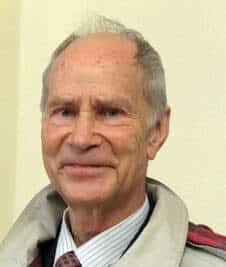
W. George Krasnow (also published as Vladislav Krasnov), Ph.D., runs the Russia and America Goodwill Association, a non-profit organization of Americans for friendship with Russia. Formerly, he was a professor and director of Russian Studies at the Monterey Institute of International Studies in California.
Under the name of Vladislav Krasnov he published three books:
- Solzhenitsyn and Dostoevsky: A Study in the Polyphonic Novel (University of Georgia Press, Athens, GA, 1979)
- Russia Beyond Communism: A Chronicle of National Rebirth (Westview Press, 1991)
- Soviet Defectors: The KGB wanted List(Hoover Institution Press, 1985)
His op-ed columns have appeared in The Wall Street Journal, New York Times, International Herald Tribune, San Francisco Examiner, San Diego Union, and Dallas Morning News.
Recent articles, signed W. George Krasnow, can be found online, as well as in Johnson’s Russia List, Russia Blog, Russia: Other Points of View, OpenDemocracy (UK) and a number of Russian-language outlets.
ATTENTION READERS
We See The World From All Sides and Want YOU To Be Fully InformedIn fact, intentional disinformation is a disgraceful scourge in media today. So to assuage any possible errant incorrect information posted herein, we strongly encourage you to seek corroboration from other non-VT sources before forming an educated opinion.
About VT - Policies & Disclosures - Comment Policy

